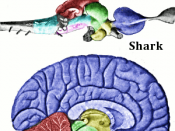In Hilary Putnam's, "The Nature of Mental States", he deals with the question of whether or not pain is a brain state or "Is the property of having a pain at time t a brain state?" (Putnam). Throughout the article, Putnam goes on to argue that to claim pain as a brain state is not an identity claim. This can only be accurate if the specific pain is a specific brain state, or "being A is being B" (Putnam). He suggests that this is not an empirical reduction, or based on sensory experience, but rather the question can only be answered through knowledge that has been independently justified independently of experience. Putnam comes to conclude that functionalism, any view which analyzes something in terms of how it functions with respect to its causes and effects, is a possible solution to this problem.
Putnam says that "pain states are brain states" has meaning, yet simultaneously, there is no meaning behind pain states being identical to brain states.
The major problem with asserting the identity theory is the merging of the meanings of a physical property and a concept. A property X can be identical to a property Y, only if X and Y are equivalent. A classic philosophical example of this is as follows: "a bachelor is an unmarried man." When questioned about the meaning of "bachelor" one can identify this term with "unmarried man." They are synonymous. Yet, one could not say that water is identical to H2O because steam and ice consist of the same combination of atoms. Concepts refer to such "things which can be identified with synonym-classes" (Putnam) or the idea of something which suggests an image or psychological sense. For example, the concept of a dog is an image one has. A dog can be...


